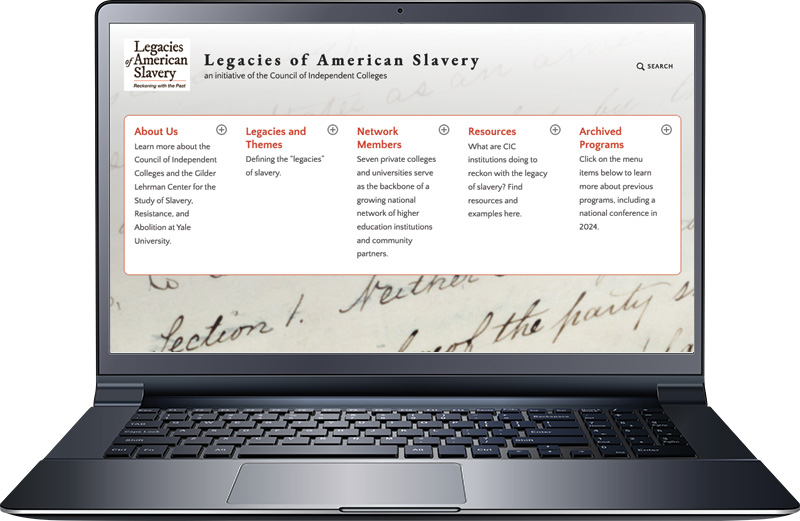CIC’s Legacies of American Slavery: Reckoning with the Past was a multi-year project, providing a variety of opportunities for CIC member institutions, their faculty members and students, and community-based partners to participate in research, teaching and learning, and public discussions about the multiple legacies of American slavery. The Legacies of American Slavery website includes links to curated resources, powerful examples of campus- and community-based programs—including collaborations that span multiple institutions—and a detailed timeline of this multi-year initiative.

The website also features reflections by faculty members and administrators from seven CIC members that served as regional organizing hubs for this national network of independent colleges, including the following:
“We created an online [and multi-institutional] archive of Lost Cause memorials on college campuses, using our own campus as a model. … [Asking students to explore the commemorative landscape of slavery] directs their attention at their world, a world that they might walk through, uncomprehending or unnoticing for most of the time. And this has had a transformative effect on the students who’ve been involved in this research.”
Woody Register, Sewanee: University of the South (TN)
“As an African American studies scholar, I assumed that there would not be very much that surprised me [during this project], and of course I was wrong about that. Oftentimes we think, ‘We’re in Illinois, what is the legacy of enslavement in a place like Illinois that was never a slave state?’ But one of the things that became really clear very early … [is that] community members [including the incarcerated men at a nearby state prison] were making those connections, talking about their family’s legacies, talking about the stories.”
Tennille Allen, Lewis University (IL)
“What are the ‘legacies of slavery’? At first it was a weird phrase that was attached to a grant, but it’s become a reasonable question that we can ask regularly. … [T]hat’s really the kind of change I wanted to see: not one class [or program] but getting a culture established where we can ask these questions, we can think about them. … I hope that we keep asking this question; I think we’ve laid the groundwork.”
Christopher Ciocchetti, Centenary College of Louisiana
“There’s something about this type of program and this type of funding that is different and more valuable than [just] the dollars you’re getting. … [Huston-Tillotson became] part of this grouping of other universities doing really good work. And that means a lot, especially for an institution like ours.”
Amanda Masino, Huston-Tillotson University (TX)


